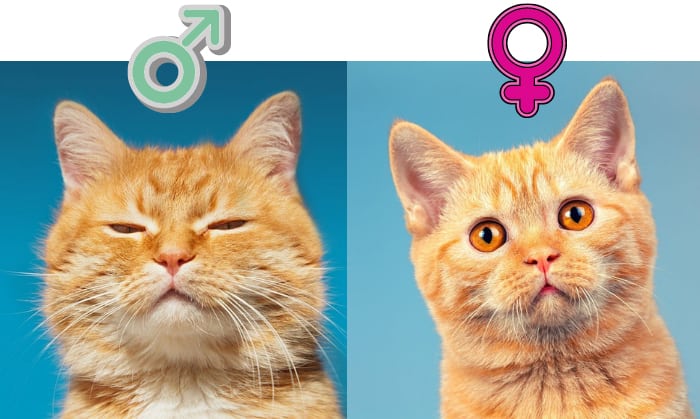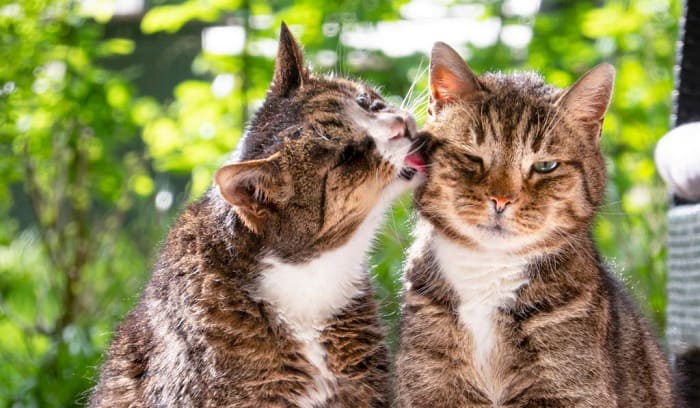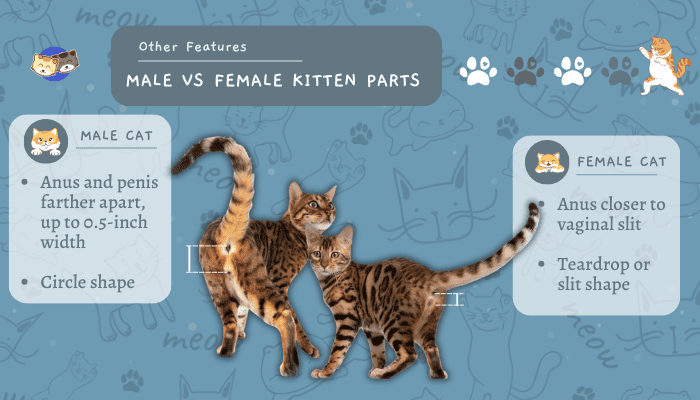Has a stray cat caught your attention lately, but you don’t know how to approach it? Figuring out the cat’s gender by face would allow you to learn how to take care of the furry friends’ needs.
Identifying if it’s a boy or girl narrows down how to act in front of them as well! If these have piqued your interest, then you’re in luck! This extensive guide will tackle how to tell cat gender by face.
Table of Contents
Difference Between Male and Female Cat Faces
You can search for pictures that show the visual comparison to quickly notice the differences that immediately tell you if it is a male or female cat.
By checking out these gender-specific features, you would be able to distinguish them from one another:
1. Males
Males are said to exhibit rounder faces compared to females, and one characteristic to look out for is their cheek pads! This provides more volume to the face of the male, giving off a softer appearance.
Their whisker pad size follows along with the male’s fuller face.
2. Females
Females look sharper and more defined due to their features. They are characterized by a slender face structure and have smaller foreheads.
NOTE! This section is for identification among adult cats that have fully grown and developed characteristics.
Other Features to Notice
1. Male vs Female Kitten Parts
At 8 weeks, a kitten has not fully grown its genitalia. It might pose some difficulties, but the other parts of cat anatomy can help us figure out the cat gender. Try checking the following parts:
- Anus
A female kitten’s anus is noticeably closer to the vaginal slit and may seem like they are in contact.
In comparison to a male kitten’s, a male kitten’s anus and penis distance are farther from one another, reaching up to a width of half an inch.
- Developing genitalia
Keep your eyes open! Although not noticeable from afar, these parts actually look different! Since they haven’t reached the peak of their development, we base on the shape of the opening near the anus.
You would be able to identify a female kitten if there is the presence of a teardrop or slit shape, while a male would manifest a circle shape.
- Fur Color
If you spot a kitten with a tri-colored fur color, chances are you came across a female kitten!
Although, this is placed lower in terms of reliability since this physical trait can mistake a male kitten for a female kitten. It is still highly recommended to check the two previous features.
2. Male Cat vs Female Stature
Aside from basing only on the facial features of our furry friends, one of the best physical indicators of their gender is their stature.
- Males tend to be of the bigger size and sometimes tower over the females in terms of their heights. They are known to be blockier and plumper and have a heavier build.
- The body composition of females is usually smaller than that of males. They have slender limbs, and their shoulders are narrower.
3. Male Cat vs Female Cat Behavior
Distinguishing cat gender is not limited to the physical and anatomical aspects of the cats; we can take into account the differences in their behaviors.
By basing on the different traits exhibited by each gender in the following points, you may even be surprised by some of these!
- Contrary to belief, males are actually the ones who are more expressive of love towards others! Despite their loving nature, though, they are more prone to being active and may even ask for attention.
- Females are known to be more silent and tend to act calmly when confronted. Although, this can be a different case when they are in heat.
Due to this event being a painful experience, they may become easily irritated. They can be on par with the energy of male cats.
Conclusion
The identification of a cat’s gender may have looked difficult to do, but checking on the anatomical, physical, and even behavioral characteristics can go a long way.
Tending to their specific needs and gaining their trust more is now possible after distinguishing their genders. Now that you know how to tell cat gender by face, feel free to share this piece of information.

I am Amy Sawy, a Doctor of Veterinary Medicine (DVM) graduate from the University of Kansas. y husband, Dr. Plummer, and I own a veterinary clinic in Phillipsburg, Kansas. In addition to my professional background, I am a devoted pet owner myself, with a household that includes dogs, rodents, and most notably, cats – a total of five felines in my home.
In 2020, I joined an organization as a professional writer, leveraging my experience and collaborating with my team to deliver the most valuable information for your cat’s care.













